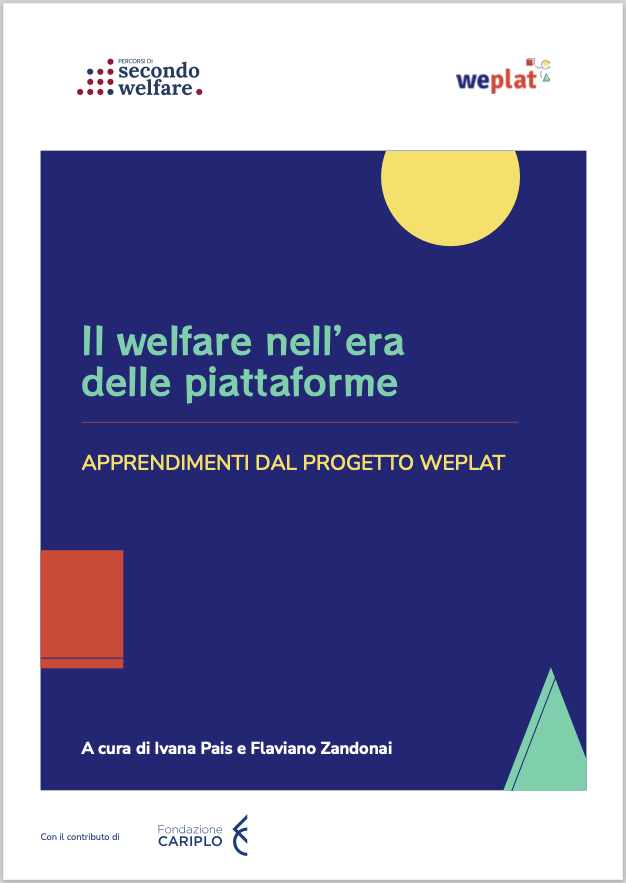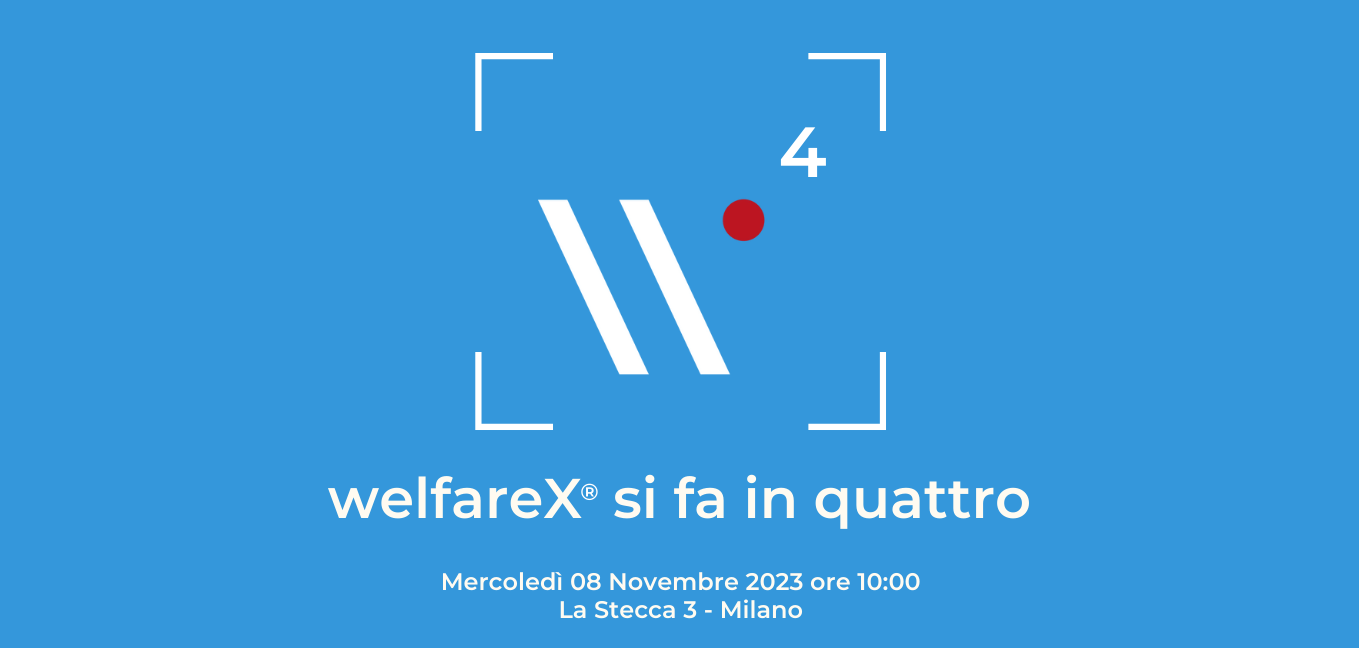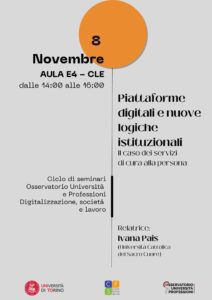La cura della persona passa sul web con le piattaforme
Sul Sole 24 Ore, Ivana Pais offre una sintesi dei risultati del progetto di ricerca WePlat. Riportiamo di seguito il testo dell'articolo:
------------------------------------------------------------------------------------------
La cura della persona passa sul web con le piattaforme
Le piattaforme di lavoro - ambienti digitali che facilitano e coordinano le transazioni tra domanda e offerta di lavoro attraverso algoritmi - si stanno diffondendo in ogni settore. La ricerca WePlat – Welfare Systems in the Age of Platforms, coordinata dall’Università Cattolica del Sacro Cuore e finanziata da Fondazione Cariplo, ha permesso di mappare e analizzare le piattaforme nei servizi di cura alla persona. Abbiamo individuato 137 piattaforme, di cui 60 offrono servizi di salute fisica e mentale, 10 servizi di educazione e cura dell’infanzia, 10 servizi di assistenza sociosanitaria e le restanti 57 una combinazione dei servizi precedenti.
L’analisi di queste piattaforme mostra la presenza di due processi: la digitalizzazione delle organizzazioni tradizionali, che offrono i propri servizi attraverso piattaforme di e-commerce; la nascita di nuove aziende che adottano modelli simili alle piattaforme digitali di lavoro in altri settori.
Il primo processo ha determinato la nascita di 29 piattaforme di welfare aziendale che offrono ai lavoratori anche la scelta di servizi di cura, su oltre cento provider che operano in questo settore e 26 piattaforme di welfare territoriale, che aggregano organizzazioni del terzo settore che offrono servizi di welfare a livello locale, di cui 16 appartenenti al network WelfareX promosso dal consorzio nazionale CGM.
Le startup digitali sono più numerose: ne abbiamo mappate 82, di cui 57 operano nel settore salute, con 31 piattaforme che offrono consulenza psicologica. Queste piattaforme possono offrire servizi direttamente online (25 aziende), oppure fare il matching online tra domanda e offerta e poi offrire il servizio in presenza (27 piattaforme) o ancora offrire servizi sia online che offline (30 piattaforme).
Le piattaforme di welfare digitale si differenziano da quelle di welfare aziendale e territoriale perché mettono in vetrina i profili dei professionisti, con foto e descrizione del percorso professionale. Nei due terzi di queste piattaforme i clienti possono scegliere direttamente il professionista; nel restante terzo, il cliente esprime i propri bisogni e poi è la piattaforma ad assegnare il professionista, anche attraverso algoritmi che effettuano il matching.
Le piattaforme di welfare digitale presentano elementi distintivi rispetto alle piattaforme che operano in altri settori. Più della metà non adotta un sistema reputazionale, che raccolga e renda visibili i giudizi lasciati dai clienti sui professionisti. Questo tema è particolarmente delicato nelle piattaforme che offrono consulenze con medici e psicologi. In un settore dove la valutazione delle competenze tecnico-professionali può essere affidata solo al giudizio dei pari, il sistema reputazionale sposta l’attenzione sulle competenze relazionali, che sono le sole che possano essere valutate dai pazienti.
Un altro elemento che caratterizza questo settore è il fatto che più della metà delle piattaforme definisce il prezzo della prestazione. Anche in questo caso, le piattaforme più interessanti sono quelle attive nel settore della salute, poiché questa modalità incrina l’autonomia professionale storicamente riconosciuta ai professionisti. Non è un caso che sia maggiormente diffusa nelle piattaforme di salute mentale, dove l’alto numero di psicoterapeuti presenti sul mercato offre alle piattaforme un maggiore potere negoziale rispetto agli altri servizi di consulenza medica.
Un ultimo elemento distintivo riguarda le condizioni di lavoro degli operatori: le uniche piattaforme di welfare digitale che prevedano la regolarizzazione del rapporto di lavoro sono quelle che riguardano medici e psicologi. Le professioni non ordinistiche – dalle attività di baby-sitting a semi-professioni come osteopatia o fisioterapia – sono intermediate tramite piattaforme che non contrattualizzano i fornitori dei servizi. Questo determina un rafforzamento delle condizioni di informalità già diffuse nel settore della cura della persona. Rispetto ai rider, che negli ultimi anni hanno rivendicato maggiori tutele, i lavoratori e le lavoratrici della cura sono penalizzati dal fatto di svolgere le proprie attività all’interno delle mura domestiche ma il fatto di essere aggregati e con profili visibili sulle piattaforme digitali potrebbe favorire nuove forme di azione collettiva.
Digitali possibili - 15^ Conferenza Annuale del Centro Nexa su Internet & Società
Venerdì 15 dicembre 2023, Ivana Pais ha presentato alcuni dei risultati della ricerca WE-PLAT nell'ambito della 15° Conferenza Annuale del Centro Nexa su Internet & Società, svoltasi presso il Politecnico di Torino.
Altre informazioni sull'evento sono disponibili al seguente link: https://www.polito.it/ateneo/comunicazione-e-ufficio-stampa/appuntamenti/news?idn=21981
Welfare in piattaforma, c’è spazio per le cooperative
Sul sito di Consorzio Nazionale CGM, è stato pubblicato un approfondimento sui risultati di WePlat, che fa luce sul ruolo delle cooperative nella piattaformizzazione del welfare
Qui il link all'articolo: https://cgm.coop/welfare-in-piattaforma-spazio-cooperative/?fbclid=IwAR1i5Vq2LB8WKVKyOLkqRrnF6KTT6aXsOwN6egmGyuyucvK0KIkCwhdyr4U_aem_AX97E8JxA6p2PNfRb3Ts1NgfK9o32SvF7h6roNY8oP4887nXlb5EEQhyhXPY82yBcDg

“In rete in Italia è ancora più facile fare la spesa piuttosto che trovare una babysitter. Di spazi per il welfare ce ne sono tanti e vanno riempiti”. Ivana Pais è docente di Sociologia economica alla Facoltà di Economia dell’Università Cattolica di Milano, direttrice del Centro di ricerca TRAILab (Transformative Actions Interdisciplinary Laboratory) e principal investigator di We Plat – Welfare system in the age of platforms. Un progetto del progetto sulle piattaforme digitali di welfare finanziato da Fondazione Cariplo con capofila l’Università Cattolica del Sacro Cuore e partner l’Università di Padova, l’agenzia community design Collaboriamo e il nostro consorzio CGM.
Il quaderno della ricerca, a cura di Ivana Pais e del nostro open innovation manager Flaviano Zandonai, realizzato in collaborazione con Percorsi di Secondo Welfare, è già stato presentato ed è disponibile on-line (scarica qui).
Ma che cosa dice alle cooperative questo importante studio? Innanzitutto, restituisce una fotografia delle piattaforme digitali di welfare sul territorio nazionale: sono 137.
59 operano nel settore della salute, 10 in quello dell’educazione e della cura dell’infanzia, 10 nell’assistenza sociosanitaria e 58 sono multisettoriali. Ci sono piattaforme di welfare aziendale, di welfare digitale, che nascono e operano in ambito strettamente digitale, e di welfare territoriale, che mettono insieme enti locali e terzo settore.
“Un dato inatteso dello studio? – esordisce Ivana Pais – Ci aspettavamo più provider di welfare aziendale. Avevamo l’aspettativa che il welfare aziendale potesse essere il precursore delle piattaforme di welfare e invece in rete i servizi alla persona sono ancora pochi e il matching tra domanda e offerta è scarso. Questo può essere legato al fatto che i lavoratori hanno budget ancora limitati a disposizione per il welfare aziendale e che è più pratico acquistare beni di consumo rispetto a servizi”.
Una carenza che lascia molto spazio alle imprese sociali, sia in termini di diffusione dei propri servizi, sia in termini di analisi di bisogni, sia in termini di offerta di veri e propri piani capaci di incidere positivamente sulla qualità della vita delle persone e dei contesti in cui esse vivono e lavorano. “L’altra sorpresa è stato il boom delle piattaforme di welfare digitale e in particolare di quelle che erogano servizi on-line di consulenza psicologica – continua la professoressa dell’Università Cattolica – Mentre rispetto alle piattaforme di welfare territoriale, che hanno la grande potenzialità di aggregare realtà e servizi, pubblici e privati, è emersa la tendenza a riportare le logiche tradizionali in piattaforma, invece che sfruttare lo strumento per una vera e propria trasformazione”.
I margini per uno sviluppo del welfare in piattaforma sono dunque altissimi con prospettive molto interessanti rispetto ad esempio all’ibridazione e all’allargamento dei beneficiari, al ripensamento dei modelli organizzativi, alla certificazione della qualità dei fornitori, alla creazione di comunità non solo tra professionisti, ma anche tra clienti o pazienti in una logica peer to peer, alla ibridazione tra le diverse tipologie di piattaforme, all’implementazione di sistemi reputazionali, ossia di valutazione.
“In generale l’interesse da parte della cooperazione alle piattaforme digitali è forte, ma è altrettanto forte la resistenza, talvolta legittima – prosegue Ivana Pais – Le piattaforme rendono evidente e aumentano le complessità e occorre trovare quelle modalità che consentano di non perdere gli elementi distintivi in termini di cura”. A partire da quegli “eroi quotidiani dell’innovazione” che ci sono e vanno accompagnati. “Da questo punto di vista – commenta la docente – welfareX è l’unica che ha attivato una comunità di welfare manager che sui territori si occupano della piattaforma. Questo fa la differenza: non lasciare da soli questi ‘eroi’, creare occasioni di confronto e di crescita e collocare il loro lavoro in un progetto più ampio e di prospettiva”.
“Il welfare si sta trasformando – è la conclusione di Ivana Pais – Le persone cercano in rete risposte ai loro bisogni e se non trovano il terzo settore, trovano altro. Occorre stare dentro la trasformazione e governarla. Questa è la sfida: agire il cambiamento anziché subirlo”.
In Italia il welfare passa sempre di più dalla rete
Su Vita, è stato pubblicato un approfondimento sui risultati di WePlat presentati nel convegno del 9 novembre in Università Cattolica
Qui il link all'articolo: https://www.vita.it/in-italia-il-welfare-passa-sempre-di-piu-dalla-rete/

In Italia il welfare passa sempre di più dalle piattaforme digitali. Dagli psicologi online alla ricerca dei baby sitter, passando per l’educazione e la salute, sono ben 137 le realtà di questo tipo attive sul territorio nazionale mappate da Welfare systems in the age of platforms – Weplat, progetto di ricerca finanziato da fondazione Cariplo che ha l’università Cattolica del Sacro Cuore come capofila in partnernariato con l’università di Padova, l’agenzia community design Collaboriamo e la rete di imprese sociali del consorzio nazionale Cgm.
Fino a poco tempo fa queste piattaforme erano il luogo privilegiato per fare acquisti online e prenotazioni di vacanze o mezzi di trasporto; oggi fungono sempre più da provider sociali e sono sempre più utilizzate anche per trovare medici, baby-sitter, psicologi, servizi sociali ed educativi. Delle 137 individuate dal progetto, 59 operano nel settore salute e di queste 32 sono specializzate in servizi psicologici; 10 nel settore di educazione e cura dell’infanzia; 10 nell’assistenza sociosanitaria; 58 sono multi-settoriali. Se guardiamo alla tipologia, 82 piattaforme nascono e operano in ambito strettamente digitale, 29 operano nel settore del welfare aziendale, fornendo servizi e fringe benefit ai lavoratori, e 26 digitalizzano i classici servizi di welfare a livello territoriale spesso erogati da enti locali e soggetti di terzo settore.
Secondo la professoressa Ivana Pais, docente di Sociologia economica all’Università Cattolica e principal investigator del progetto, «Se a livello globale le piattaforme digitali come Uber, Airbnb, Amazon si presentano sempre più come un oligopolio dai caratteri “imperiali”, come ricorda il sociologo Vili Lehdonvirta nel suo fortunato saggio “Cloud Empires” recentemente pubblicato da Einaudi, a livello nazionale e nello specifico campo del welfare assistiamo a un fenomeno in evoluzione, che assume caratteristiche ben diverse e ci obbliga a ripensare, almeno in parte, le nostre categorie interpretative dei comportamenti di consumo e dei modelli di lavoro».
Le case histories approfondite da Walpat mostrano chiaramente l’utilizzo di piattaforme digitali per trovare medici (Doctorium), baby-sitter (Babysits), psicologi (Unobravo), servizi educativi e sociali (WelfareX), sostegno familiare e alla genitorialità (Parentsmile) e, non da ultimo, partecipazione sociale e cittadinanza attiva (Merits). La professoressa Pais mette in luce altre caratteristiche delle piattaforme di welfare, oltre al loro grande numero e all’assenza – almeno per ora – di un «Amazon del sociale». «In primo luogo, la maggior parte sono piattaforme phygital, cioè che offrono i loro servizi non solo in ambiente digitale, ad esempio attraverso video chiamate, ma incontrando faccia a faccia le persone. In secondo luogo, il matching tra bisogno e risposta non è ancora delegato ai soli algoritmi». Infine, la sociologa richiama l’attenzione sulla «scarsa diffusione di meccanismi di recensione online rispetto alla qualità del servizio», che invece caratterizza in modo evidente le piattaforme mainstream. Una scelta che deriva anche dalle specificità legate alla professionalizzazione di alcuni servizi e dal fatto che alcune di queste piattaforme veicolano servizi di welfare “certificati” da soggetti pubblici.
Dal punto di vista del design di piattaforma, la ricerca ha evidenziato che anche nel welfare, come in altri settori, non si può più parlare di un modello dominante. Nei casi studio analizzati sono emersi tre diversi modelli: il primo facilita l’incontro fra pari, il secondo tra professionisti e pazienti, il terzo tra organizzazioni del non profit e cittadini. «Ogni modello presenta un grado di intermediazione diverso a cui corrisponde un utilizzo differente di strumenti e funzionalità. Conoscerli permette a designer e gestori di progettare con più consapevolezza evitando quegli errori di impostazione e layout che hanno portato in passato alla chiusura di diverse piattaforme italiane», sostiene Marta Mainieri fondatrice di Collaboriamo ed esperta di sharing e community economy.
Un aspetto di particolare rilievo per determinare il successo delle piattaforme di welfare è legato al ruolo degli utenti dei servizi. Per Martina Visentin, ricercatrice dell’Università di Padova «le piattaforme studiate mostrano un’abilitazione nei confronti degli utenti che può superare la dicotomia tipica del welfare tra beneficiari passivi e consumatori di servizi. L’utente sceglie il welfare in piattaforma per la flessibilità e tempestività nella risposta al bisogno, per il contenimento dei costi, ma anche per la reputazione positiva di servizi già presenti sul territorio. Sono quindi comportamenti che possono contribuire ad affrontare alcuni problemi strutturali del welfare italiano come la frammentazione delle risorse e delle prestazioni».
I risultati di Weplat sono stati approfonditi e discussi in un convegno tenutosi giovedì 9 novembre all’Università Cattolica del Sacro Cuore, che è stato introdotto dal keynote speech di Uma Rani, dell’’Organizzazione Internazionale del Lavoro delle Nazioni Unite. Divisi in quattro panel di grande attualità – qualità del lavoro, ruolo degli ecosistemi d’innovazione, protagonismo degli utenti e design delle piattaforme – i ricercatori di Weplat hanno avuto l’opportunità di confrontarsi con qualificati discussant provenienti sia dal mondo accademico sia dalle organizzazioni che, a vario titolo, sostengono l’innovazione nel campo del welfare. Tra questi ultimi Giovanni Fosti, presidente del Fondo per la Repubblica Digitale, di recente costituito dalle fondazioni bancarie italiane con una dotazione di oltre 350 milioni di euro per contrastare il divario digitale nel nostro paese, secondo cui «è necessario riconoscere che la comunità è un elemento che genera valore, cosa che i soggetti imprenditoriali che hanno operato attraverso le piattaforme hanno dimostrato e dovrebbero averci insegnato».
E ancora Laura Orestano, Ceo dell’incubatore SocialFare di Torino, che ha accelerato la piattaforme di psicologi online Unobravo, consentendo alla startup di realizzare un round d’investimento di 17 milioni di euro. Socialfare, a|cube e Fondazione Italiana Accenture ETS sono partner dell’acceleratore “Personae”, uno dei programmi della Rete Acceleratori di Cassa Depositi e Prestiti Venture Capital, che sostiene l’avvio e il primo finanziamento di imprese innovative nel campo del welfare. «È evidente», afferma Simona Torre, direttrice generale di Fondazione italiana accenture Ets, «che il processo di trasformazione digitale del welfare è in fase ormai matura, e che molte piattaforme digitali di welfare stanno dimostrando di saper mediare bisogni reali e servizi adeguati. Al tempo stesso gli ecosistemi in grado di sostenere questo processo trasformativo del welfare possono migliorare e per questo serve, soprattutto da parte delle Fondazioni, più apertura al lavoro in connessione e più coraggio nell’esplorare nuovi modelli di supporto all’impresa sociale». «Si tratta di un’opportunità», gli fa eco Flaviano Zandonai, open innovation manager del consorzio nazionale Cgm, «non solo per far emergere una nuova generazione di startup ma anche per innestare modelli di piattaforma tra soggetti già affermati nel welfare, in particolare se si tratta di imprese sociali e altri enti di terzo settore».
Ulteriori informazioni sul progetto sul sito e nell’ebook Il welfare nell’era delle piattaforme, che raccoglie i principali apprendimenti, oltre a delineare nuove piste di ricerca pubblicato da Percorsi di secondo welfare.
Foto in apertura da Unsplash
È online il Quaderno “Il welfare nell’era delle piattaforme. Apprendimenti dal progetto WePlat”
È online, liberamente scaricabile, il Quaderno "Il welfare nell'era delle piattaforme. Apprendimenti dal progetto WePlat". Il quaderno, curato da Ivana Pais e da Flaviano Zandonai, raccoglie gli approfondimenti pubblicati sul sito di Secondo Welfare fra marzo e giugno 2023, insieme ad alcune interviste ad osservatori privilegiati con cui i curatori hanno discusso di sfide e opportunità che riguardano le piattaforme digitali di welfare.
Il Quaderno è liberamente scaricabile accedendo a questo link: https://www.secondowelfare.it/studio/il-welfare-nellera-delle-piattaforme/

Il posto delle piattaforme di welfare nei sistemi di welfare locale
Rosangela Lodigiani presenta alcuni dei risultati della ricerca WE-PLAT all'interno dell'incontro "WelfareX si fa in quattro", organizzato da WelfareX presso LaStecca 3.0, a Milano, mercoledì 8 novembre 2023
Altre informazioni disponibili al seguente link: https://welfarex.it/x/convention

Piattaforme digitali e nuove logiche istituzionali. Il caso dei servizi di cura alla persona
Mercoledì 8 novembre 2023, alle 14:00, Ivana Pais presenterà alcuni dei risultati della ricerca WE-PLAT con un intervento dal titolo Piattaforme digitali e nuove logiche istituzionali. Il caso dei servizi di cura alla persona all'interno del Ciclo di Seminari "Digitalizzazione, società e lavoro", organizzati da Osservatorio Università e Professioni - Dipartimento di Culture, Politica e Società in collaborazione con il Corso di Laurea in Comunicazione, ICT e Media.
Altre informazioni sull'evento sono disponibili al seguente link: https://www.dcps.unito.it/do/avvisi.pl/Show?_id=0vu5&fbclid=IwAR1kRfrLSejZEW9MaTyJLAIMK3zFCbWPE2Nv57YJ1aI1VoTc97k3UWuYLGA

Save the date | Evento presentazione dei risultati del progetto WE-PLAT
È con grande piacere che annunciamo l'evento di presentazione dei risultati del progetto di ricerca Weplat - Welfare systems in the age of platforms, al quale hanno lavorato per tre anni l'Università Cattolica del Sacro Cuore, l'Università degli Studi di Padova, Collaboriamo e il Consorzio Nazionale CGM, con il sostegno della Fondazione Cariplo.
L'evento si svolgerà giovedì 9 novembre dalle 09:00 in poi in Aula Pio XI presso l'Università Cattolica del Sacro Cuore a Milano (Largo Gemelli,1) .
Vi aspettiamo!
Ingresso libero previa registrazione: https://www.eventbrite.com/e/biglietti-convegno-finale-weplat-presentazione-dei-risultati-di-ricerca-736350703777
I dettagli dell'agenda saranno condivisi a breve.

Platforms and welfare | Towards a fairer platform work: policy process and social demands
Venerdì 13 ottobre 2023 alle 14:30 Ivana Pais presenterà alcuni dei risultati della ricerca WE-PLAT con un intervento dal titolo Platforms and welfare all'interno del Seminario Towards a fairer platform work: policy process and social demands presso la Fondazione Feltrinelli.
Il seminario finanziato da COST Action Platform Work Inclusion Living Lab in collaborazione con Fondazione Giangiacomo Feltrinelli e il progetto Horizon Europe INCA.
Il programma completo è disponibile qui: https://fondazionefeltrinelli.it/eventi/towards-ita/

Servizi di cura e competenze digitali | Milano digital week
Lunedì 9 ottobre 2023 alle 17:30 Ivana Pais presenterà alcuni dei risultati della ricerca WE-PLAT durante l'evento Servizi di cura e competenze digitali organizzato nell'ambito della Digital Week di Milano.
Il programma completo è disponibile qui: https://milanodigitalweek.com/servizi-di-cura-e-competenze-digitali



